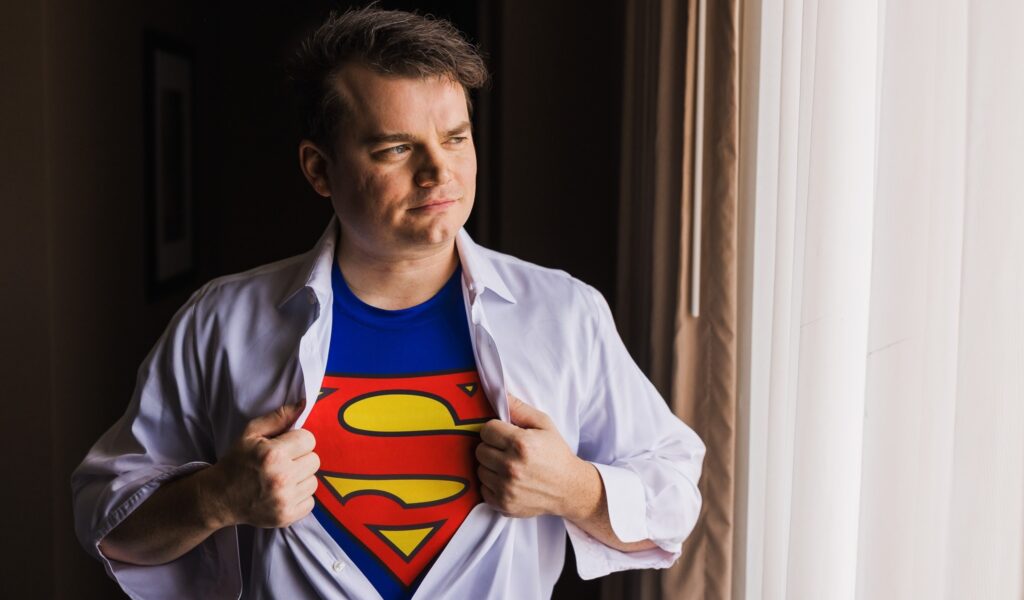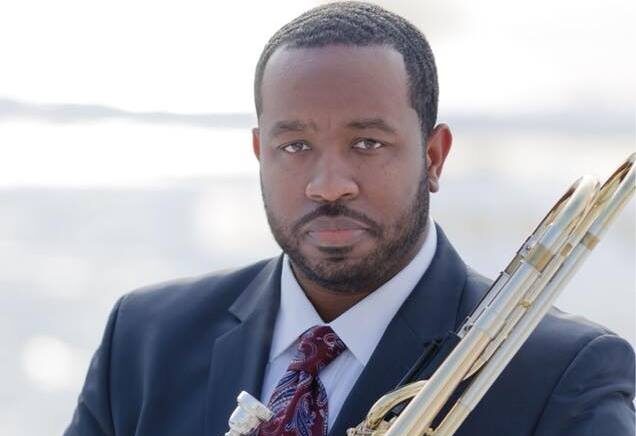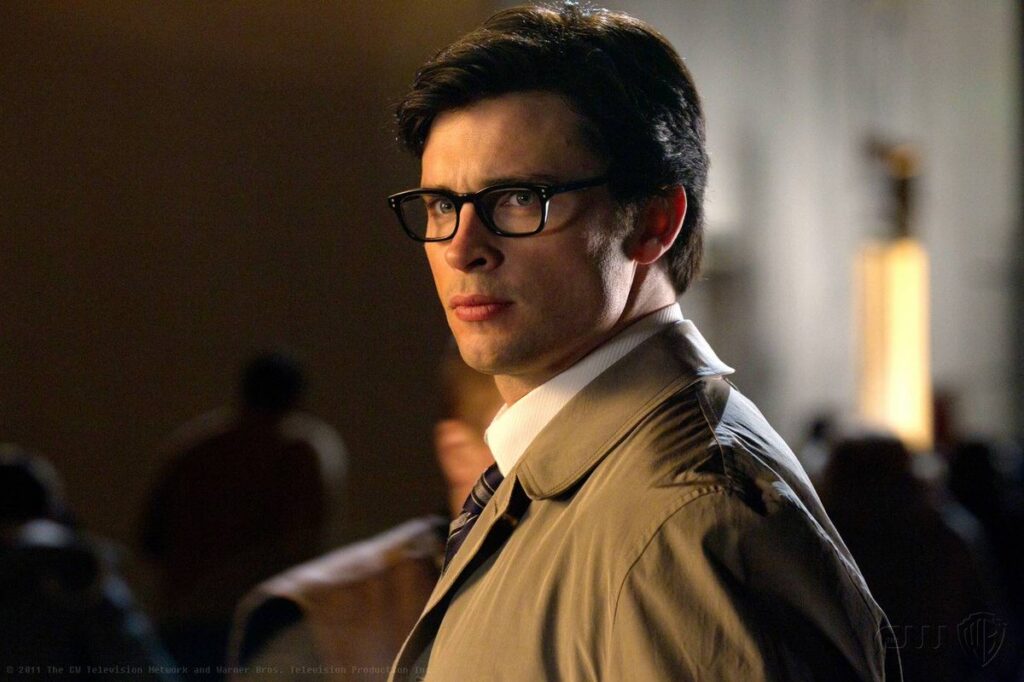In the series finale of “Smallville,” Jonathan Kent (John Schneider) gently hands the Superman costume to Clark Kent (Tom Welling). “Always hold on to Smallville,” he tells his adopted son, imploring him to remember his rural roots as he soars to the skies of Metropolis.
For most audiences, Jonathan’s words were a reminder that for all its sci-fi shenanigans, the heart of “Smallville” lay in the titular Kansas town where Clark grew from a boy to a man. Yet for one fan, “Always hold on to Smallville” wasn’t just a nudge. It was a manifesto.
“‘Smallville’ is my favorite TV show of all time,” Houston-based podcaster Zach Moore declared on the debut episode of “Always Hold On To Smallville,” which he began hosting in 2016. “I know it may sound weird, but if I had to pick one, it would be ‘Smallville.’”
To me, it didn’t sound weird at all. As someone who stuck with “Smallville” through the good times (Clark and Alicia, ooh la la), the bad (Henry James Olsen, ugh), and the bizarre (Lana Lang, sword-wielding witch?!), I always felt a kinship with Moore’s fandom. I just never took it as far as he did.
“For 10 years, I grew up watching this show, growing up alongside Clark Kent…comparing myself to him,” Moore said on the first episode of “Always,” in which he vowed to study the show in its entirety. “Bottom line: ‘Smallville’ was always there.”
At the time, audiences could have been forgiven for assuming that Moore wouldn’t always be there. “Smallville” had run for 10 seasons and 217 episodes—and if Moore was serious about scrutinizing all of them, he was setting off on a decade-long crusade.
Spoiler alert: He made it. Last week, Moore and his colleagues’ analysis of the “Smallville” finale, recorded in Hollywood, confirmed what I always knew but struggled to admit: “Always Hold On To Smallville” is better—wiser, wittier, more emotional—than “Smallville” itself.
“Zach, how do you feel?” guest host Victoria Male asked as the festivities commenced. “I feel really overwhelmed right now,” Moore replied earnestly, having just watched Project Beacon, an hour-long compilation of messages from fans and friends of the podcast.
“It was fun, but strange, to listen to all these people sing my praises for an hour,” Moore admitted. The ultimate fan now had fans of his own—and he sounded at once exhilarated and uneasy as he reflected on his ascension.

When “Smallville” ended in 2011, its endurance was hardly inevitable. The show’s concluding double episode (creatively titled “Finale”) was a cornucopia of baffling choices, including Welling’s refusal to don the “So much better in Technicolor” Superman suit.
“I said, ‘That’s not our show,’” Welling told Entertainment Weekly in 2017, defending an episode rife with no’s: No full-body shot of its star in red-and-blue regalia, no marriage to Lois Lane, and no memories for Lex Luthor (whose mind was wiped, absurdly, by a smidge of amnesia juice).
While Moore loathes “Finale,” he expressed minimal outrage in the final episodes of “Always Hold On To Smallville.” Any fan grievances he still harbors paled next to his companionship with his co-hosts, including his best friend, Lance Laster.
“Mostly, I’m just proud of you,” Laster told his pal, adding that “Smallville” mattered to him “because it brought us together, so I will always hold on to that for everything—and will ever be thankful to the show for that.”
Once I’d absorbed those words, it occurred to me that without “Always Hold On To Smallville,” I wouldn’t know who Lance Laster is. I wouldn’t know that he plays the trombone. That he’s an adjunct professor of music. That he loves Hallmark movies.
Is it strange that I’m invested in the personal and professional lives of Moore and Laster? Perhaps, but no one would ask that question if they were celebrities, like the marquee names that they occasionally court (Moore has appeared on TalkVille, a podcast co-hosted by Welling).
Inevitably, when celebrities show up on “Always,” the effect is alienating, even off-putting. If you want to know why hosting is as different from interviewing as driving is from directing traffic, listen to Moore in the presence of his most famous and loquacious quests, like “Smallville” actor Sam Witwer.
“Look, when Sam’s here, we’re going to talk about what Sam wants to talk about,” Moore proclaimed after Witwer hijacked an episode by pontificating about “Star Trek.” Witwer may have wanted to talk, but I wanted to listen to Moore, not starry interlopers speaking in self-important platitudes.

Thankfully, the climax of the podcast was anchored by a cast of “Always Hold On To Smallville” mainstays: Moore, Laster, Male, Matt Truex, and Kevonte Chilous, a veteran of the United States Marine Corps who first watched the end of “Smallville” on a laptop in Afghanistan.
“I am sitting here, a couple glasses of wine in, in Hollywood, recording a podcast with you guys,” Chilous marveled. “A few years ago, I would have never imagined even leaving my hometown. I would have never imagined having friends like this—genuine friends at all.”
I wish I could say that I felt nothing but joy in regard to the bonds that “Always Hold On To Smallville” helped forge, but I lack the Kryptonian cool necessary to ward off my all-too-human feelings. Jealousy, especially.
Like Moore, I have dedicated years of my adult life to podcasting, and I envy the community he has built. It’s one thing to emulate his jovially precise style of hosting; it’s another to embody the unifying spirit of his leadership.
“You started this whole thing,” Laster told Moore. “You did it—you did it with care, you did it with love, you did it with energy, you did it with passion.” Implicit in his praise was an affecting truth: Though Moore’s care, love, energy, and passion were sparked by “Smallville,” they have also transcended it.
While Moore’s episode-by-episode voyage has ended, his duties as Smallvillian-in-chief aren’t yet discharged. Not only are there “Smallville” comics and novels to cover, but Moore’s creation has spawned an entire network of “Always Hold On To” pop-culture podcasts.
“Kal-El, you have traveled far,” Jor-El (Terence Stamp) tells Clark during the fifth season of “Smallville.” “One journey has ended. A new journey is about to begin. Welcome home, my son.” Adventure is cyclical, for both the hero in a cape and the podcaster with a mic.
Will Moore and company find more “Smallville” minutiae to exhume? I don’t doubt it, even if they’ve dissected nearly everything under Earth’s yellow sun, from Lex’s inexplicable “Veritas window” to Chloe Sullivan’s ever-shifting hairstyles to Clark’s underrated dark trench coat.
“Let’s start it over from episode one,” Laster said half-jokingly as the discussion of “Finale” wound down. “Don’t think I haven’t thought about it,” Moore replied.



